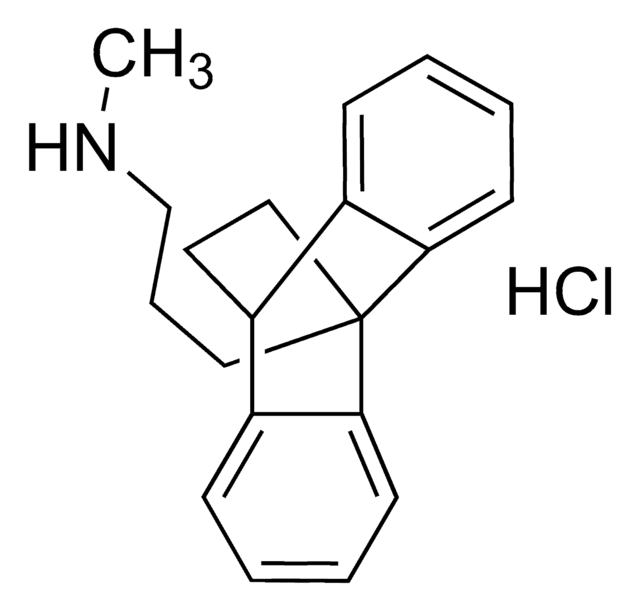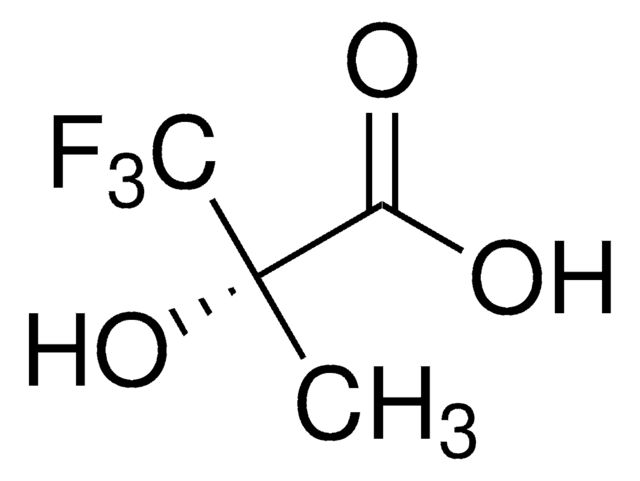D-906
Desipramine hydrochloride solution
1.0 mg/mL in methanol (as free base), ampule of 1 mL, certified reference material, Cerilliant®
About This Item
Productos recomendados
grade
certified reference material
form
liquid
feature
Snap-N-Spike®/Snap-N-Shoot®
packaging
ampule of 1 mL
manufacturer/tradename
Cerilliant®
concentration
1.0 mg/mL in methanol (as free base)
technique(s)
gas chromatography (GC): suitable
liquid chromatography (LC): suitable
application(s)
clinical testing
format
single component solution
storage temp.
2-8°C
SMILES string
Cl.CNCCCN1c2ccccc2CCc3ccccc13
InChI
1S/C18H22N2.ClH/c1-19-13-6-14-20-17-9-4-2-7-15(17)11-12-16-8-3-5-10-18(16)20;/h2-5,7-10,19H,6,11-14H2,1H3;1H
InChI key
XAEWZDYWZHIUCT-UHFFFAOYSA-N
Gene Information
human ... SLC6A2(6530)
General description
Application
- Pharmacological Treatments for Localized Provoked Vulvodynia: Reviews current pharmacological treatments, including tricyclic antidepressants like desipramine hydrochloride, emphasizing their role in managing chronic pain conditions, crucial for ongoing research in neuropharmacology and clinical practice (Bajzak et al., 2023).
- Desipramine induces anti-inflammatory dorsal root ganglion transcriptional signatures: Highlights the use of desipramine hydrochloride in neurobiological research, specifically its effects on inflammatory responses in nerve injury models, underscoring its significance in neuropharmacological studies (Serafini et al., 2024).
- Effect of lipid emulsion on neuropsychiatric drug-induced toxicity: Discusses the therapeutic potential of lipid emulsions in managing toxicity caused by drugs, including desipramine hydrochloride, which is essential for improving safety profiles in clinical settings (Hwang and Sohn, 2024).
- Sustainable beeswax modified cellulose paper for the determination of tricyclic antidepressants: Researches innovative methods for detecting tricyclic antidepressants like desipramine hydrochloride in biofluids, pivotal for advancing forensic and clinical toxicology (González-Bermúdez et al., 2024).
- Sleep-wake dependent hippocampal regulation of fear memory: Although indirectly related, this study forms part of the broader context of neurological research where desipramine hydrochloride could be used to modulate neurochemical pathways, relevant for understanding sleep-related memory processes (Wen et al., 2024).
Legal Information
related product
signalword
Danger
Hazard Classifications
Acute Tox. 3 Dermal - Acute Tox. 3 Inhalation - Acute Tox. 3 Oral - Flam. Liq. 2 - STOT SE 1
target_organs
Eyes
Storage Class
3 - Flammable liquids
wgk_germany
WGK 1
flash_point_f
49.5 °F - closed cup
flash_point_c
9.7 °C - closed cup
Certificados de análisis (COA)
Busque Certificados de análisis (COA) introduciendo el número de lote del producto. Los números de lote se encuentran en la etiqueta del producto después de las palabras «Lot» o «Batch»
¿Ya tiene este producto?
Encuentre la documentación para los productos que ha comprado recientemente en la Biblioteca de documentos.
Los clientes también vieron
Nuestro equipo de científicos tiene experiencia en todas las áreas de investigación: Ciencias de la vida, Ciencia de los materiales, Síntesis química, Cromatografía, Analítica y muchas otras.
Póngase en contacto con el Servicio técnico













